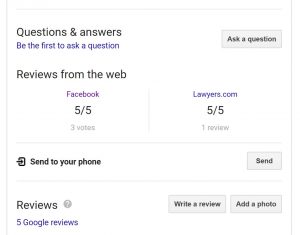Don’t Gather Reviews on Only One Platform
A lot of people mistakenly believe that Google values its own reviews more than those left on other platforms. An online business review is a written sentiment left directly by a client on any website or platform. Reviews represent an ongoing conversation your customers are having about your business online and they can contribute to building the type of positive reputation every firm strives to achieve. The top three platforms clients can leave reviews on are Google, Facebook, and Yelp. There are also legal-specific platforms clients can leave reviews on such as Avvo and Lawyers.com.
According to Moz, it is important to not put all of your reviews in one basket. Not only for algorithmic reasons, but because Google and other search engines sometimes filter, mistakenly loose reviews, or pull reviews from different platforms. While it is nice to have client reviews across different platforms, be careful because not all carry an equal amount of value. To identify which industry-specific platforms carry value, simply search a specific keyword phrase in search. When I searched, “criminal defense lawyer reviews”, I found that the top search results were dominated by yelp and top legal directories. This shows that Google values reviews from these top directories within the legal industry.

By using Google My Business I was able to identify other review platforms of value. In the example above, data is being pulled from Facebook and Lawyers.com. After looking at a few different Google My Business Pages I found this space to be dominated by legal directories, social platforms, yelp, and even client testimonials from the firm’s own website.
When prioritizing review efforts it is important to remember these key factors:
- Reviews across multiple platforms can help build client’s trust. Focus on not having clients leave reviews only on one platform because search engines may filter, lose, or pull reviews from different platforms. Additionally, these platforms feed each other, for example, Yelp pushes reviews to Bing, Yahoo, and Apple Maps.
- Acquire reviews at a natural rate for your firm. It can be viewed as spammy for a firm to acquire a large number of reviews in a short time period. Tipping off search engines and potential clients that the reviews may not be legitimate.
- Rankings may have an impact on your reputation. It is important to actively respond to the platforms that are most prominently displayed in search results; responding to feedback that clients leave and helping implement changes if needed.
Reviews are beneficial to a firm regardless of whether they’re positive or negative. These platforms provide a space where clients can have a discussion while providing owners an opportunity to respond to, and implement, changes. It is important to have reviews be a part of your local search engine optimization strategy. Focus on determining which platforms have value and perform the best in your firm’s search results.
